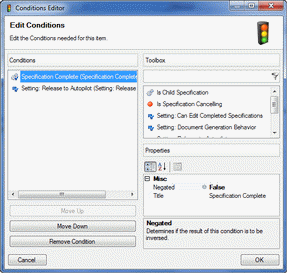Condition Editor
The Condition Editor can be used to control whether specific
tasks in a task sequence are executed, or whether a specification
flow operation or transition is hidden or disabled.

The Condition Editor is divided into two
re-sizable columns:
- The Conditions column shows the conditions that have been
setup for the task, operation, or transition.
- The
Toolbox column
shows a searchable list of toolbox items that can be added to the
condition column to become a condition in a condition sequence.
The properties for the currently selected condition are
shown below the toolbox.
At any time, you can click "Cancel" to discard your changes.
To Add a Condition to a Condition Sequence
- Drag the toolbox item to add from the toolbox to the condition
column.
- Configure the condition's properties in the property grid.
To Reorder a Condition in a Condition Sequence
- Select the condition to reorder.
- Click the "Move Up"/"Move Down" buttons to move the
condition up or down.
To Remove a Condition from a Condition Sequence
- Select the condition to remove.
- Click the "Remove Condition".
To Edit Properties for a Task
When a condition is selected, its properties are shown in the
Properties window.
All conditions have a "Title" property which can be used to give
the condition a descriptive name.
In addition, all conditions have a "Negated" property which can
be used to reverse the meaning of the condition. e.g. instead of
checking if a setting is true, checking if a setting is NOT
true.
Depending on the type of condition, there may be extra
properties.
Each property has a green or a gray orb next to the property
name. A gray orb means that the property has a static value, and a
green orb means that the property's value is based on a rule. To
switch a property between static or rules-based, double click the
orb next to the property name.
To build a static value, type the value into the box next to the
property name in the property grid.
To build a rule, click the property name in the property grid,
and then click the ellipsis "..." button that appears to launch the
rule builder.
For help
with a specific condition, see the
Toolbox help topic.
Additional Resources
MyDriveWorks - Tech Tips
Create Closed Child
A way of completing a Child Specification, pulling data inputted in the Parent Specification, without needing to open the Child.
Import Specifications
Using either the .tab file or a .xml file provided in the drivepkg, generate multiple Specifications at once using Autopilot.
Tech Tips Index
View all available MyDriveWorks Tech Tips.
DriveWorks Tech Tips Index
